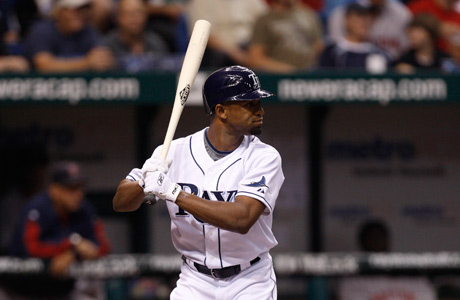Para Rumbiar
Robert Creeley in the outfield.

Image courtesy Tampa Bay Rays
I write from Caracas, the murder capital of the world, where I’ve been employed by the Leones to score runs and prevent balls from falling in the outfield. At the ankles of the Ávila Mountain amongst a patch of dusky high-rises, the downtown grounds of el Estadio Universitario packed beyond capacity are ripe for a full-bodied poem. A mere pitching change is an occasion “para rumbiar,” and the purse-lipped riot squad is always on the move with their spanking machetes swinging from their hips. The game isn’t paced necessarily by innings or score. It’s marked by the pulsating bass drums of the samba band that trail bright, scantily-clad, head-dressed goddesses strutting about the mezzanine. The young fireworks crew stand mere feet from flares that don’t always set out vertically, sometimes landing in the outfield still aflame. “The wave” includes heaving drinks into the sky.
In earning my stripes as a professional baseball player I’ve been through many cities and have stared out of hotel windows all over the Americas. Ball players are mercenaries, taking assignments indiscriminately. Throughout the minor leagues you’ll find yourself slouched on a bus, watching small towns roll by matter-of-factly like stock market tickers, on your back in a new nondescript room, or “shopping for images” (Allen Ginsberg) in a Wal-Mart, hunched over a cart in no rush.
Like poetry, baseball is a kind of counter culture. The (optional) isolation from the outside world (which I often opt for); the idleness about which—and out of which—so many poems are written or sung: I see this state of mind as a blessing. Sometimes, in fact, when I haven’t turned on a television or touched a newspaper for months, freed from the corporate bombast, poetry is the only dialect I recognize.
Long ago Robert Creeley confirmed my suspicion that words strung even sparingly together can be as aurally powerful as anything else we have. He has been my most important poet, because I can take him anywhere, like oranges—even reduced to nothing in both physical and mental exhaustion, nauseous and half asleep bussing from a red-eye.
One of my first managers always preached separation from the game for the sake of our own health, and for the sake of our performance. The game can be maddening, and we ought to corner ourselves in this trade only so far. I’m in love with baseball, but eventually my prime will end, and she’ll slowly break my heart. Baseball has remained remarkably impervious to modernity, but is, like any modern industry, highly alienating. I turn to poetry because it is less susceptible to circumstance. I’m not especially touched when a poet deals with a ball game; I’m not especially interested in having one world endear itself to the other. Right now I need them apart, right now I’m after displacement, contrast. The thick wilderness of, say, late Ashbery can wrangle with the narrowness of competition.
Fernando Perez is an outfielder for the Tampa Bay Rays. He received a degree in American studies and completed the creative writing program at Columbia University in New York City, where he lives in the offseason.
-
Related Collections
-
Related Articles
- See All Related Content


This is a beautiful snippet into the life of the baseball player, and a wonderful cross-comparison of the poetry/baseball connection.